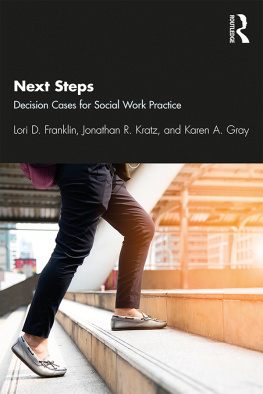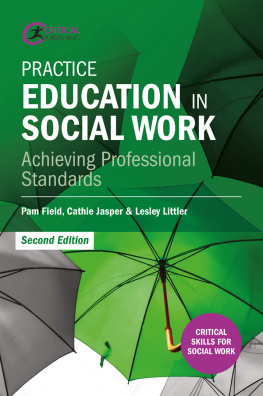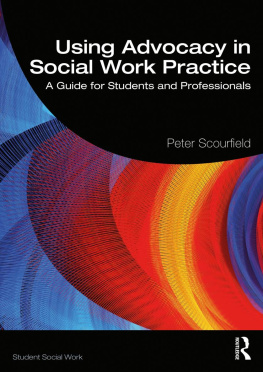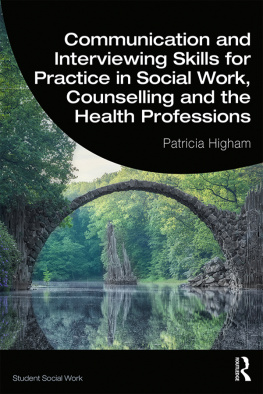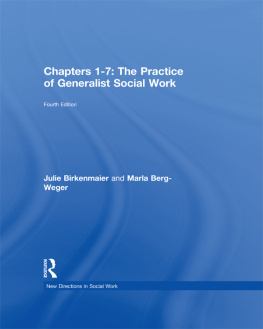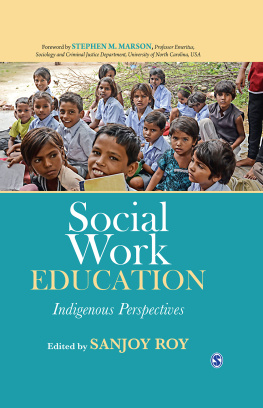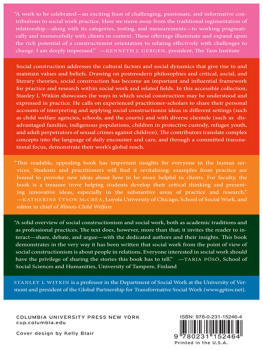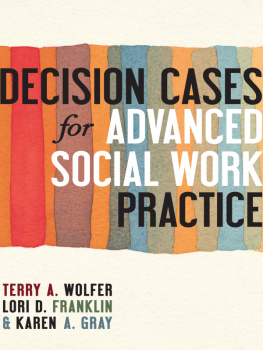Next Steps
Social work students consistently struggle to apply theory to practice, or use the knowledge of textbooks and classrooms in the field. Vignettes and scenarios represented in textbooks are often simplistic, too tidy to be realistic, and with clean resolutions. Next Steps: Decision Cases for Social Work Practice highlights the complex, messy nature of social work practice in a way that is engaging to students, allowing them to step into the role of a practicing social worker. This book is a collection of decision cases from multiple areas of social work practice, designed to enhance the quality and depth of classroom case discussion and analysis. These realistic, compelling cases present dilemmas about which even experienced practitioners may disagree. This allows rich classroom discussion that enhances critical thinking, provides real-life application, and creates numerous opportunities to apply content and knowledge acquired throughout a social work education experience.
Lori D. Franklin, DSW, LCSW is a Clinical Associate Professor at the University of Oklahoma. She has previously co-authored a similar volume of decision cases, Decision Cases for Advanced Social Work Practice (Wolfer, Franklin, & Gray, 2013). Dr. Franklin, along with Dr. Gray, attended a week-long workshop with Terry Wolfer at the University of Texas and has been writing decision cases since 2008. She has a wide range of clinical practice experience in mental health as well as experience in social work licensure supervision. She teaches courses related to advanced direct practice in social work and an integrative seminar that utilizes the decision case teaching method.
Jonathan R. Kratz, MSW, LCSW is a Clinical Assistant Professor at the University of Oklahoma. He has an extensive background in juvenile justice and forensic social work as well as in mental health and school-based services with children and families. Most of his clinical work has been with Spanish speaking populations. He teaches across the direct practice curriculum including courses in mental health, group work, advanced clinical social work theories of practice, and the integrative seminar.
Karen A. Gray, PhD, LCSW, LSW-Admin is Professor Emeritus at the University of Oklahoma. She has an extensive history of decision case development and teaching, including co-authorship of Decision Cases for Advanced Social Work Practice (Wolfer, Franklin, & Gray, 2013). She has also authored two articles and three book chapters regarding decision cases. Dr. Grays experience as a community organizer and macro practice focus, as well as her clinical experience, allows her to contribute a variety of cases that highlight multiple areas of practice. She teaches courses related to community organizing and development, practice with organizations and communities, and the integrative seminar with decision cases.
First published 2019
by Routledge
52 Vanderbilt Avenue, New York, NY 10017
and by Routledge
2 Park Square, Milton Park, Abingdon, Oxon OX14 4RN
Routledge is an imprint of the Taylor & Francis Group, an informa business
2019 Taylor & Francis
The right of Lori D. Franklin, Jonathan R. Kratz, and Karen A. Gray to be identified as authors of this work has been asserted by them in accordance with sections 77 and 78 of the Copyright, Designs and Patents Act 1988.
All rights reserved. No part of this book may be reprinted or reproduced or utilised in any form or by any electronic, mechanical, or other means, now known or hereafter invented, including photocopying and recording, or in any information storage or retrieval system, without permission in writing from the publishers.
Trademark notice: Product or corporate names may be trademarks or registered trademarks, and are used only for identification and explanation without intent to infringe.
Library of Congress Cataloging-in-Publication Data
A catalog record for this title has been requested
ISBN: 978-1-138-49984-3 (hbk)
ISBN: 978-1-138-49985-0 (pbk)
ISBN: 978-1-351-01395-6 (ebk)
Lori D. Franklin, DSW, LCSW is a Clinical Associate Professor at the University of Oklahoma. Her teaching is in areas of mental health, direct practice, and clinical interventions. Her work with decision cases is a natural extension to her pre-academic career in mental health services and supervision, as well as her continued work in clinical supervision and practice. She can be contacted at lfranklin@ou.edu.
Jonathan R. Kratz, MSW, LCSW is a Clinical Assistant Professor at the University of Oklahoma. His teaching is primarily focused on direct practice with an emphasis on Motivational Interviewing and treating suicidality. Prior to joining the faculty at the University of Oklahoma, he worked with Spanish speaking clients in forensic, school, and family based service settings. Jonathan can be contacted at jkratz@ou.edu.
Karen A. Gray, PhD is Professor Emeritus at the University of Oklahoma. She is currently completing a book on the early years of Communities Organized for Public Service in San Antonio, the oldest and most successful Industrial Areas Foundation affiliate. She has conducted research in other areas of macro practice, including SNAP participants use of Farmers Markets.
The authors would like to thank Erik Zimmerman and all of the team at Taylor & Francis for the guidance through the process of creating and publishing this volume.
The University of Oklahoma and The Anne and Henry Zarrow School of Social Work have supported the writing of this volume through leadership, time, and support from graduate assistants. The authors would particularly like to thank our chapter co-authors Bethany Trueblood, Christina Miller, Kathy Shook McCallie, and Nicholas Dubriwny. The authors are grateful to fellow case method seminar instructors Mary Brandt, Steve Wells, Ann Riley, Tonia Caselman, Cynthia McPherson, Herman Curiel, and Jennifer Dell.
Several MSW students were involved in the transcription of interviews and editing of documents. We would like to thank Jeseney Whitacre, Rachel Baluh, and Andrea Crank for the time and energy put forth in these tedious tasks.
Jon and Lori thank spouses Erin Kratz and Rebekah Herrick for proofreading, editing, and ongoing support of our academic work.
We thank our students over the years of teaching the course who have taught us something new every time we teach a case. We have the privilege of contributing to the critical thinking and practice wisdom of newly launching students, and we take that privilege very seriously. We are honored to be a part of students lives and appreciate all we learn from them.
Without a doubt, however, our most sincere thanks is extended to the case reporters who shared their stories bravely and openly. These social workers are a vital part of the education of future professionals who will benefit from their honesty and vulnerability expressed in a story of doubt. We appreciate them greatly and thank them for their contribution to the profession. We are forever impressed by the thoughtful, reflective, compassionate social workers we find in these interviews who strive to offer the highest quality social work services they can. Thank you.
But what should we do next? What would you do? What is the right answer?
Instructors who use this book are likely to hear these pleas for guidance from anxious students. Students are likely to say these things because they, well, want there to be a solution that neatly uses the content of the course lectures to address a problem. Students are often fearful of judgment or harsh evaluation and may feel their job is to guess the magic answer that corresponds with the instructors perception. This fear can stifle discussion, paralyze students from expressing opinions, or leave students confused and upset. Social work students are usually conscientious learners hoping to gain skills to help them do the right things to help others, perhaps not realizing that there is not a single right answer in most situations.

